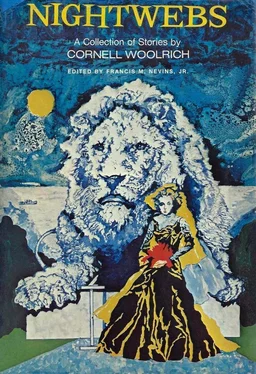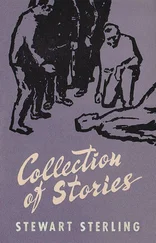He slowly poised one large, paddle-like foot on the bottom step and eight minutes later he was upstairs on the platform, the ordeal of the ascent safely behind him until tomorrow night. As he stepped out from behind the turnstile, a Sixth Avenue train was standing by with its gates in the act of closing. Step could have made it; a man who had come up behind him darted across and did. Step preferred not to. It would have meant hurrying. There’d be another one along in a minute. The old adage about cars and women was good common horse-sense.
This was 59th, and the trains alternated. The next would be a Ninth Avenue. They separated at 53rd, but both wound up together again at South Ferry, so it didn’t matter which he took. More seats on the Ninth anyway. And so, because he refused to bestir himself — this story.
A three-car Ninth flashed in in due course. Step got up off the bench — it wouldn’t have been like him to stand waiting — and leisurely strolled across to it. He yawned and tapped his mouth as he perambulated sluggishly down the aisle. The crabby, walrus-mustached conductor, who had had to hold the gate for him, felt a sudden unaccountable urge to stick a pin in him and see if he really could move fast or not, but wisely restrained the impulse, maybe because he had no pin.
The first car had a single occupant, sitting on one of the lengthwise seats, visible only up to the waist. The rest of him was buried behind an outspread newspaper, expanded to its full length. Step sprawled out directly opposite him with a grunt of satisfaction, opened his own paper, and got busy relaxing. All the windows were open on both sides of the car, and it was a pleasant, airy way to ride home on a warm night. Two pairs of legs and two tents of newsprint on opposite sides of the aisle were all that remained visible. The conductor, maybe because Step irritated him vaguely, retired to the second car, between stations, instead of this one.
The train coasted down Ninth Avenue sixty feet in the air, with the buildings that topped it by a story or two set back at a respectable distance from its roadbed. But then at Twelfth Street, it veered off into Greenwich Street and a change in spacing took place. The old mangy tenements closed in on it on both sides, narrowing into a bottleneck and all but scraping the sides of the cars as they threaded through them. There was, at the most, a distance of three yards between the outer rail of the super-structure and their fourth-floor window-ledges, and where fire-escapes protruded only half that much.
What saved them from incessant burglarizing in this way was simply that there was nothing to burglarize. They were not worth going after. Four out of five were tenantless, windows either boarded up or broken-glass cavities yawning at the night. Occasionally a dimly-lighted one floated by, so close it gave those on the train a startling impression of being right in the same room with those whose privacy they were cutting across in this way. A man in his underwear reading a paper by a lamp, a woman bent over a washtub in a steaming kitchen. Their heads never turned at the streaming, comet-like lights or the roar of the wheels going by. They were so used to it they never gave it a thought. It was just part of their surroundings. Nor did those on the train show any interest either, as a rule. The few there were at this hour had their papers up and their backs to the passing scene. There isn’t anything pretty about the lower West Side of New York. The river a block over is blotted out by docks, and the connecting side-streets are roofed with produce sheds.
In the front car, the two solitary occupants continued immersed in their reading-matter. Christopher and Houston had gone by, and they pulled into Desbrosses Street. As they cleared it again a moment later, the train slackened briefly, slowed down without coming to a full halt, then almost immediately picked up speed once more. Perhaps some slight hitch on the part of a track-signal or a momentary break in the “shoe” gripping the third rail. Step took his eyes off his paper and glanced around over his shoulder, not because of that, but to find out how near his destination he was.
There was an open window staring him in the face, flush with the car-window that framed him, and so close it was almost like a continuation of it, a connecting-tunnel into the tenement’s front room. There was no light in the first room, but light shone feebly in from the room beyond through an open doorway. At the same time the train-lights swept in and washed across the walls like a sort of lantern-slide, from left to right.
In the double glare, fore and aft, two forms could be glimpsed, moving unsteadily about together. A man and woman dancing drunkenly in the dark, with exaggerated motions of their arms and heads. Lurching, reeling, pressed tightly together. “Wonder what the big idea of that is?” Step thought tolerantly. “Too warm for lights, I guess—” The noise of the cars drowned out whatever music was being supplied them for their strange activities.
Just as the two superimposed windows slipped apart out of perspective, the wheels of the train cracked loudly as though passing over a defect in the rails. At the same time, one of the shadow-dancers struck a match and it went right out again, just a stab of orange, and some water-borne insect or other winged into the car past Step’s face. He slapped vaguely at it, went back to his newspaper. The train picked up speed and headed down the track for Franklin Street.
The party across the aisle had fallen asleep, Step noticed when next he glanced over across the top of his paper. He grinned broadly at the sight he presented. There was a man after his own heart. Too much trouble even to fold up his paper and put it away. The breeze coming in on Step’s side of the car had slapped it back against his face and shoulders; his hands were no longer holding it up, had dropped limply to his lap. His legs had sprawled apart, were wobbling loosely in and out like rubber with the motion of the car.
Step wondered how he could breathe with the layers of paper flattened that way across his nose and mouth, you could actually see the indentation his nose made through it. And that insect that had blown in — it looked like a large black beetle — was perched there on the paper just above it. Step thought of the innumerable comedy-gags he’d seen where someone tried to swat a fly on a sleeper’s face, and of course the sleeper got the full impact of it. If he only knew the guy, he’d be tempted to try that now himself. Still, it was an awful lot of effort to reach across a car-aisle just to swat a horse-fly.
As they began drawing up for Franklin, the air-current of their own momentum rushed ahead, outdistanced them. It tugged loose the outside paper of the sleeper’s outspread newspaper, no longer clamped down by his fingers, and sent it whirling up the aisle. Step blinked and went goggle-eyed. The black bug was still there, on the page underneath, as though it had bored its way through! A second sheet loosened, went skimming off. The damn thing was still there, as though it were leaping invisibly from one page to the other!
Step got to his feet, and though the motion was slow enough, there was a certain tenseness about him. He wasn’t grinning any more. Just as he did so, the train came to a halt. The jolt threw the sleeper over on the side of his face, and all the rest of the newspaper went fluttering off, separating as it went. The black bug had leaped the last gap, was in the exact middle of the sleeper’s forehead now, this time red-rimmed and with a thread of red leading down from it alongside his nose, like a weird eyeglass-string, to lose itself in the corner of his mouth. Step had seen too many of them not to know a bullet-hole when he saw one. The sleeper was dead. He didn’t have to put his hand in under his coat, nor touch the splayed hand, caught under his body and dangling down over the aisle like a chicken claw, to make sure of that. Death had leaped out at him from the very print he was reading. Such-and-such, then — period! A big black one, right into the brain. He’d never known what had hit him, had died instantly, sitting up. It wasn’t the breeze that had slapped the paper up against him; it was the bullet. It wasn’t an insect that had winged past Step’s shoulder that time; it was the bullet.
Читать дальше












